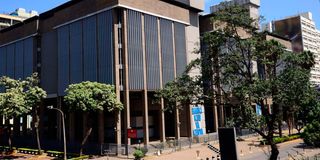Premium
Tough times ahead as Thugge strikes on loans interest rates

Kenyans should brace themselves for an increase in loan costs within the next 60 days, after the Central Bank of Kenya (CBK) raised the benchmark interest rate by one percentage point to 10.5 percent.
This is the highest policy rate increase since the apex bank began its current tightening cycle in March 2022, and the first time the benchmark rate has been in double digits since January 2018.
According to the CBK, the average commercial bank lending rate is currently at 13.1 per cent, up from 12.7 percent in January and 12.4 percent at the end of the third quarter of 2022.
Credit growth to the private sector is now at risk of slowing, as commercial banks take their cue from the CBK and price loans to reflect the recent upward adjustment in the policy rate.
CBK Governor Kamau Thugge's first Monetary Policy Committee meeting, held exactly a week after he took office, was also a departure from the bank’s bi-monthly calendar, which ideally would have seen the committee meet in July after the last convergence in May.
The Central Bank has cited the prevailing elevated cost of living pressures as the reason for the jumbo rate increase, with the headline inflation rate for May 2023 reported at 8.0 percent —still trending higher than the apex bank’s prescribed ceiling of 7.5 percent.
The bank says it is wary of lurking pressures from the external environment, which could amplify local inflationary pressures.
Dr Thugge’s first rate increase also comes just days before a number of revenue-raising measures contained in the Finance Bill 2023 come into effect, many of which are expected to push up the cost of living.
In particular, the standardisation of the Value Added Tax on petroleum products, which will increase the applicable rate from 8.0 per cent to 16.0 per cent, is expected to have a significant impact on the economy and push up the general cost of living.
“The committee noted the continuing inflationary pressures, the heightened risks to the inflation outlook, the increased global risks and their potential impact on the global economy. The MPC therefore concluded that there was scope for further tightening of monetary policy in order to anchor inflation expectations. The committee therefore decided to raise the policy rate from 9.5 percent to 10.5 percent,” the CBK statement said.
Despite expressing considerable concern over the state of the foreign exchange market, Dr Thugge's first Monetary Policy Committee meeting downplayed the prevailing pressures on the shilling, even though it took place against the backdrop of the local unit breaching the 140.0 units to the dollar mark.
The CBK has cited strong inflows from exports and increased foreign reserves as reasons for its bullish outlook on the foreign exchange market.
During his confirmation hearing, Dr Thugge signalled his intention to launch a local dollar-denominated bond as one of his immediate priorities upon assuming office to prop up the sliding shilling.
“The CBK’s foreign reserves, which currently stand at $7.7 billion (4.07 months of import cover), continue to provide adequate cover and a buffer against any short-term shocks in the foreign exchange market.
“Merchandise exports remain strong, growing by 5.5 percent in the 12 months to May 2023 compared to a similar period in 2022. Receipts from tea and manufactured goods increased by 10.2 percent and 25.4 percent respectively,” CBK said.
Dr Thugge's first meeting comes at a time the banking sector is grappling with a loan book whose quality is deteriorating.
CBK reports that the ratio of non-performing loans to total loans in the banking sector stood at 14.9 percent in May, up from 14.6 percent in April. The sectors driving the deterioration in asset quality in the banking sector are reported to be manufacturing, trade, real estate and transport and communication.



